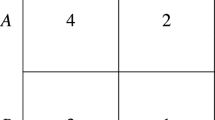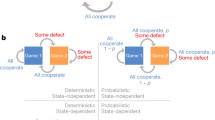Abstract
This paper analyzes players’ long-run behavior in evolutionary coordination games with imitation and one-dimensional local interaction. Players are assumed to interact with their two neighbors and to imitate actions with the highest average payoffs. We find that the payoff-dominant equilibrium survives in the long run with positive probability. The results derive the conditions under which both risk-dominant-strategy and payoff-dominant-strategy takers co-exist in the long run. The risk-dominant equilibrium is the unique long-run equilibrium for the remaining cases. This study extends and complements the analyses of Eshel et al. (Am Econ Rev 88:157–179, 1998) and Vega-Redondo (Evolution, games, and economic behaviour, 1996). Combining Alós-Ferrer and Weidenholzer’s (Econ Lett 93:163–168, 2006; J Econ Theory 14:251–274, 2008) and our results, we conclude that players’ long-run behavior varies with imitation rules and information collecting modes. Finally, we show the convergence rate to all the long-run equilibria.
Similar content being viewed by others
References
Alós-Ferrer C, Weidenholzer S (2006) Imitation, local interactions, and efficiency. Econ Lett 93: 163–168
Alós-Ferrer C, Weidenholzer S (2008) Contagion and efficiency. J Econ Theory 14: 251–274
Anwar AW (2002) On the co-existence of conventions. J Econ Theory 107: 145–155
Apesteguia J, Huck S, Oechssler J (2007) Imitation-theory and experimental evidence. J Econ Theory 136: 217–235
Bergin J, Lipman BL (1996) Evolution with state-dependent mutations. Econometrica 64: 943–956
Blume LE (1993) The statistical mechanics of strategic interaction. Games Econ Behav 5: 387–424
Blume LE (1995) The statistical mechanics of best-response strategy revision. Games Econ Behav 11: 111–145
Chen HC, Chow Y (2001) On the convergence of evolution processes with time-varying mutations and local interaction. J Appl Probab 38: 301–323
Chen HC, Chow Y (2009) Evolutionary prisoner’s dilemma games with one-dimensional local interaction and imitation. Adv Appl Probab 41: 154–176
Ellison G (1993) Learning, local interaction, and coordination. Econometrica 61: 1047–1071
Ellison G (2000) Basins of attraction, long-run stochastic stability, and the speed of step-by-step evolution. Rev Econ Stud 67: 17–45
Ellison G, Fudenberg D (1995) Word-of-mouth communication and social learning. Quart J Econ 110: 93–125
Ely JC (2002) Local conventions. Adv Theor Econ 2: 1–30
Eshel I, Samuelson L, Shaked A (1998) Altruists, egoists, and hooligans in a local interaction model. Am Econ Rev 88: 157–179
Freidlin MI, Wentzell AD (1984) Random perturbations of dynamical systems. Springer Verlag, New York
Kandori MG, Rob R (1995) Evolution of equilibria in the long run: A general theory and applications. J Econ Theory 65: 383–414
Kandori MG, Mailath G, Rob R (1993) Learning, mutation, and long run equilibria in games. Econometrica 61: 29–56
Morris S (2000) Contagion. Rev Econ Stud 67: 57–78
Robles J (1998) Evolution with changing mutation rates. J Econ Theory 79: 207–223
Robson AJ, Vega-Redondo F (1996) Efficient equilibrium selection in evolutionary games with random matching. J Econ Theory 70: 65–92
Vega-Redondo F (1996) Evolution, games, and economic behaviour. Oxford University Press, Oxford
Weidenholzer S (2010) Coordination games and local interactions: A survey of the game theoretic literature. Games 1: 551–585
Young P (1993) The evolution of conventions. Econometrica 61: 57–84
Author information
Authors and Affiliations
Corresponding author
Rights and permissions
About this article
Cite this article
Chen, HC., Chow, Y. & Wu, LC. Imitation, local interaction, and coordination. Int J Game Theory 42, 1041–1057 (2013). https://doi.org/10.1007/s00182-012-0353-7
Accepted:
Published:
Issue Date:
DOI: https://doi.org/10.1007/s00182-012-0353-7




